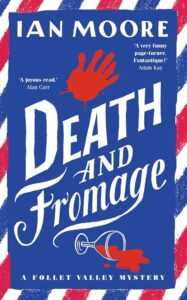There weren’t many of us growing up in small town England in the 1980s who wore a fedora hat. Even fewer, who affected a slight lisp and wore an oversized trench coat with the collars turned up. In fact, certainly in our small town, there was just one. Me.
Humphrey Bogart made a huge impression on me. He may have been long dead by the time I came along, but that didn’t matter, cool is cool, and Bogart literally had it in Spades. One of the threads that seemed to run through nearly all his films was the DA, the District Attorney. He was either fighting the DA, working for the DA, running from the DA, or actually the DA and again, the glamour of that title was a completely different world. According to the movies, the US District Attorney is either crusading, righteous and empathetic, or heartless, ambitious and corruptible and it was all so different from what I knew of the English system. I’m not saying none of those qualities exist in the English system, but no one role, or one individual, had such power that they could affect not just the outcome of an investigation but the sentencing as well. It was always fascinating to me, and when I moved to France and began writing crime fiction, I found another, entirely different system again.
Firstly, the English police-judicial system is different from the US. In England the police investigate independently of the judiciary and present their case to the Crown Prosecution Service (CPS) who will then decide whether there are sufficient grounds for prosecution. The US system has the police more answerable to the DA’s office as an investigation continues, but for ‘wire-taps’ and other warrants, they must still go higher for permission, to a judge. The French system has all of these various offices in the one role, the juge d’instruction, or investigating magistrate. In the US, the DA represents the state, in the UK, the CPS represents the state, in France, the ‘independent’ juge d’instruction is appointed by the state, but represents the ‘truth’. This juge controls the police investigation and the judicial process right up until court. In France, they are known as ‘supercops’.
Imagine being a crime writer and stumbling on that particular gem!
The famous French novelist Honoré de Balzac described these investigating magistrates as the ‘most powerful men in the world.’ Now, given that Balzac was also known to drink up to fifty cups of coffee a day, it’s possible that he was given to frenzied exaggeration, but they are powerful, and they are feared. It was no accident that a former President of the Republic of France tried his best to reduce their influence and standing while he was in office, and then was subsequently convicted of corruption. The French juge d’instruction, for this writer, casts a romantic figure, up there with the great cinematic district attorneys of US folklore. Like the US, many of these figures seek political office, so does that affect their independence, their search for the truth? It shouldn’t obviously but writing crime fiction isn’t about the good guys, it’s about flaws. Flaws in the villains and flaws in the heroes.
My first book featuring Juge Matthieu Lombard, is called The Man Who Didn’t Burn, and we join Lombard just as he’s thinking of leaving the judiciary. His wife has died a year before from a terminal illness and he is on suspension by the state under suspicion of tampering with evidence in a domestic murder. It’s time to move on, he concludes, friendless. When an Englishmen is found crucified in a French nearby village however, only Lombard can investigate, because Lombard himself is half-English. So begins an investigation where he must seek the truth from the local French villagers and a small English community who live with them. Being half-French, the English don’t trust him; being half-English, the French don’t trust him. And being an investigating magistrate who doesn’t like to just sit behind his desk as most do, the police don’t trust him either.
What this situation gave me as a writer was the opportunity to throw in some great DA tropes of classic Hollywood. Is Lombard corrupt? Does he care enough about the job to do it properly? Is he prepared to risk his position to get to the truth? All of those questions arise, but in a rural France setting surrounded by chateaux, a medieval city and countryside and families that have barely changed in centuries. It’s such a fun mix to write. I may not have put Lombard in a trench coat and fedora but read closely and you’ll see that they’re there.
There have been many depictions of the DA in movies and on television. Law and Order, the hit US drama, had some fantastic actors like Sam Waterson and Dianne Wiest showing the moral and personal difficulties of holding the position. Kevin Costner played DA Jim Garrison in Oliver Stone’s JFK, a powerful man trying to fight the system. Batman’s arch enemy ‘Two-Face’ was a former district attorney whose disfigurement meant he was shunned by society, so he turned to crime, exacting his own sense of ‘justice’.
Here are a few favorite classic District Attorneys:
Johnny Eager (1941)
Lana Turner falls in love with Robert Taylor’s no good hood who was sent down by her step-father district attorney.
Knock on Any Door (1949)
Crusading, born in the slums lawyer, Humphrey Bogart goes up against the DA to show that a case of murder was a product of a poor upbringing, asking the jury for leniency.
Alias Nick Beal (1949)
Incorruptible DA, Thomas Mitchell, vows to rid the city of crooks and help youth find a better way. He promises nothing will stand in his way, but has he made a pact with Ray Milland’s devil?
Illegal (1955)
Edward G Robinson’s overly aggressive district attorney sends the wrong man to the chair. He resigns, becomes an alcoholic and a magnet for the wrong type of client.
The Enforcer (1951)
Humphrey Bogart is a crusading district attorney with a chance to finally nail the mob boss and founder of Murder inc.
The People Against O’Hara (1951)
Spencer Tracy plays a former successful prosecutor who’s a recovering alcoholic. He makes a comeback as a defence attorney defending a neighbour’s son on a charge of homicide.
Anatomy of a Murder (1959)
Former DA, James Stewart, defends a lieutenant accused of the murder of a bartender. Why is he a former DA? Because he was voted out! Who would vote against Jimmy Stewart?
***


















